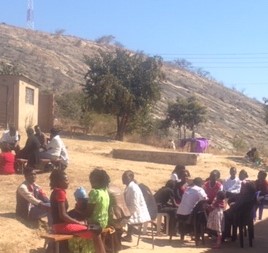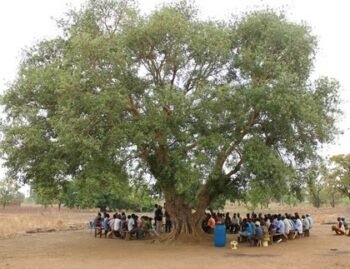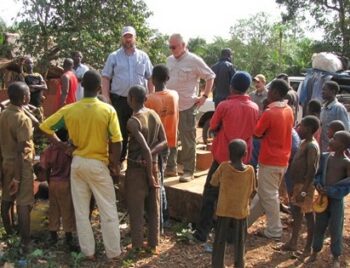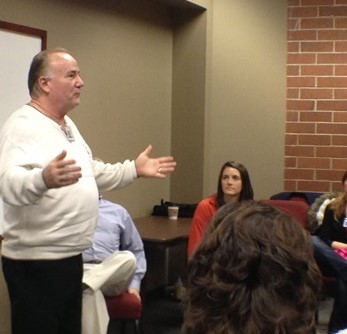
By Jerry Wiles — “What translation of the Bible did Jesus use for His quiet time?” That is a question a friend uses to begin a conversation about our walk with God. During the Jesus movement in the early 1970s, we often heard the term, “Spending time in THE WORD”, meaning Bible reading. A follower of Jesus who spent 15 years in prison for his faith was asked the question, “What sustained you during those years? His answer was, “We had no Bibles, no church, no pastors or opportunities for fellowship.” He went on to say, “It was Christ in us who sustained us.”
There are many valuable traditions and spiritual disciplines that can enhance our relationship and walk with God. However, our life in Christ and our walk with Him is not sustained by what we do, our spiritual disciplines. It is sustained by the indwelling, resurrection life of the Lord Jesus. It is the reproducing life of Christ in us that is the key to a fruitful and victorious life.
Power of The Word – Spoken and Written
Most references throughout the Bible to the Word of God are not referring to a written document, but a spoken communication. When referring to God’s Word written, it’s usually called Scripture. While Bible reading is important, there is increasing emphasis these day on Scripture Engagement. That could include various oral art forms, as well as broadcast and digital media.

There is a growing awareness with many now for the need to focus more on making disciples, rather than church planting and church growth, although we’re usually talking about the same thing. Just as there are various expressions of The Word, there are many expressions of church. There is the universal church, the regional (or city church), and the local congregations or communities of followers of Jesus.
The Power of Small, Simple, and Reproducible
Small, simple, reproducible, and economical congregations are where the greatest growth of the Kingdom is taking place, much like the Early Church. When we recognize that a true church can be a small, simple cell group or assembly of believers, it opens up many new possibilities for church growth and multiplication. When addressing the idea of establishing congregations or communities of followers of Jesus everywhere and among all people groups, the methods and strategies of orality become vital. We know that the majority of the unreached people groups around the world are bible-less, living in oral cultures or as oral-preference learners and communicators.
While Bible translation and literacy programs are important, people can still enter a relationship with the Lord and become reproducing followers of Jesus even before they have the printed text of Scripture or learn to read. That may seem radical to some in our post-reformation, modern Western culture. However, we have many examples today as well as throughout history and in the Early Church. Our experience has also shown us that Orality Training can enhance and accelerate Bible translation and literacy programs.

The Value of Understanding Oral Learners
Orality-based methods and strategies open up all kinds of possibilities for Great Commission efforts, communicating the gospel, making disciples, and doing so according to the preferred methods of the receptor culture. In our Orality Training programs with Living Water International, we emphasize that it’s not enough to proclaim the gospel; people need to hear it, understand it, be able to respond to it, remember it and pass it on. We want to make sure it’s biblical, cross-cultural, reproducible, and transferable to the ends of the earth.
With appropriate training in orality methods, followers of Jesus are able to go to any place or people group and communicate the gospel, make disciples, and plant churches. These methods require no written material or technology. Our best models, of course, are Jesus, His first apostles, and the Early Church.
As important as the written text has been throughout history, most people have come to faith in Christ by some form of spoken or oral method. Based on our collective experience over the past 40 years, some of us would advocate that orality-based methods of communication and training can greatly accelerate the church planting and disciple-making movements. In fact, we have several thousand years of history with the orality understanding. It’s one of the most effective ways and means that people have learned, communicated, and processed information from the beginning of time.
The Power of Stories and Questions
Asking questions, telling stories and building relationships may seem like simple steps, but they can have a powerful impact. We’ve heard many testimonies of how Bible Storying and Orality Training experiences have created opportunities for removing barriers and building relationships and community across various traditional, ethnic, tribal, and racial differences. Across the world, God is using mega-churches, small churches, and all kinds and sizes to advance His Kingdom

Orality can play a vital role in planting new churches and even launching movements of networks of churches and faith communities. For example, prayer walking (which is more than prayer and more than walking) can be a catalyst for church planting movements. It can be as simple as connecting with people, sharing the gospel, and seeing people come to Christ, then gathering them for group discussions. With appropriate follow up, reproducing disciple-making cell groups can develop, all with oral methods, requiring no literature or technology.
While the Orality Movement is perceived by some as just storytelling or communication methods for non-readers, it is much more. Worldview, cultural value systems, sociology, psychology, theology, anthropology, and oral traditions are just a few of the many disciplines and facets to the overall orality domain. Of course, the work of the Holy Spirit is foundational to all effective and sustained mission advancement. Apart from the work of the Spirit, no tools, techniques, methods, or strategies will produce lasting fruit.
Some Key Factors to Consider
Perhaps it seems too simplistic, but there are some key factors we need to rethink, unlearn, or relearn to be more effective and fruitful. Ask yourself these questions:
* Is there a difference in the modern term “discipleship” and what Jesus meant by make disciples?
* What does a biblically based, culturally relevant church look like in your community?
* What does the Church exist for?
* How much and what do people need to know to enter a relationship with the Lord?
* How much and what do they need to know to become reproducing disciple-makers?
* How much and what do they need to know to become church planters, pastors or missionaries?
These are all important questions. The answers should not be based on modern Western, post-reformation thinking, but rather on the essence of what we learn from Scripture and the Early Church.
Think about orality-based methods of communication in disciple-making and church multiplication as sowing the seed of the Word of God into people’s hearts. Telling stories and asking questions is something everyone can do. When we tell the true stories from the Word of God, the Holy Spirit can touch hearts and change lives. It’s the Good News of Jesus, the Word of God, that has the power to transform lives and communities. In our Orality Training, we emphasize that you don’t have to be a great storyteller, because we have great stories to tell.
Thinking Outside Modern Western Models
Thinking outside of our modern Western models and traditions, it opens many more possibilities for Kingdom expansion. It’s not about buildings, programs, and institutions, but groups and communities of followers of Jesus that reproduce and spread more rapidly. Orality methods and strategies, of course, make that possible—even necessary in some cases. There are some denominations that only recognize a real church when they own property and have a building. This idea can greatly restrict the possibilities of reproducing disciple-making and church planting movements.
Another important topic in relation to reproducing church planting movements is the area of discipleship vs. disciple-making. It’s not within the scope of this article, but there is a distinction between the modern American concept of discipleship and a biblical understanding of disciple-making. I recently read an article by a prominent church leader who was making the case that daily Bible reading and verse-by-verse expository preaching are necessary for what he referred to as discipleship. As valuable as Bible reading and expository preaching are in their appropriate contexts, they are certainly limited in terms of reaching and discipling those in oral cultures and oral preference learners.
For more information, visit — www.water.cc/orality-training and/or www.orality.net



